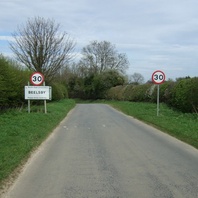
Viking Names
Beelsby
Beelsby, in the Haverstoe Wapentake of Lincolnshire, perhaps comes from the rare Old Norse male personal name Beli and the Old Norse element bý ‘a farmstead, a village’.
Read More
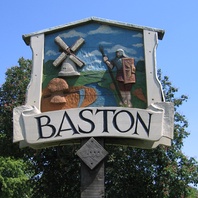
Viking Names
Baston
Baston, in the Ness Wapentake of Lincolnshire, is an Anglo-Scandinavian hybrid compound from the Old Norse male byname Bak meaning ‘back’ and the Old English element tun ‘an enclosure; a farmstead; a village; an estate’.
Read More

Viking Names
Dalby
Dalby, in the South Riding of Lindsey in Lincolnshire, comes from the Old Norse element dalr ‘a valley’ and Old Norse bý ‘a farmstead, village’. Thus the meaning of the place-name is ‘a farmstead, village of the small valley’, which is topographically appropriate.
Read More
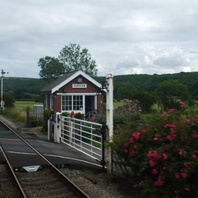
Viking Names
Howsham
Howsham, in the Yarborough Wapentake of Lincolnshire, is a simplex place-name from the dative plural of Old English hūs or Old Norse hús, both elements have the meaning ‘a house; also sometimes used of a building for special purposes’, so húsum ‘at the houses’. The weakly stressed -um was subsequently interpreted as -ham. This is a common formation in Denmark, so the place-name is likely Danish in origin.
Read More

Viking Names
Temple Normanton
Temple Normanton, in the Scarsdale Hundred of Derbyshire, takes its name from the Old English ethnonym Norðman ‘Northman, Norwegian’ and the Old English element tun ‘farm, settlement’. There are several places of this name, predominantly in the East Midlands: five in Nottinghamshire, also others in Derbyshire, Leicestershire, Lincolnshire and Rutland, and one in the West Riding of Yorkshire. Previously the prefix was North to distinguish it from South Normanton. The prefix Temple refers to previous ownership by the Templars. Traditionally, the place-name has been interpreted as referring to a settlement of Norwegians (in an area where most of the Scandinavian settlers were Danes). However, the exact implications of such a name are not yet fully understood and are the subject of ongoing work by Dr Jayne Carroll of the Institute for Name-Studies, University of Nottingham.
Read More
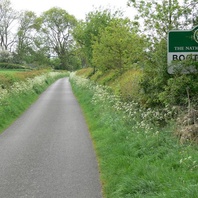
Viking Names
Boothorpe
Boothorpe, in the West Goscote Hundred of Leicestershire, probably comes from the Old Danish male personal name Bo (Old Norse Búi) and the Old Norse element þorp ‘outlying farm, settlement’. Alternatively, the first element of the place-name could be Old English boga or Old Norse bogi ‘bow’ which would be topographically appropriate because the settlement lies on a curving hilltop.
Read More
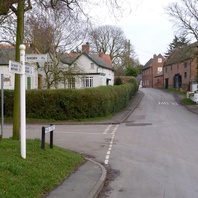
Viking Names
Shoby
Shoby, in the East Goscote Hundred of Leicestershire, is a Scandinavian compound from the Old Norse male personal name Sigvald, a reflexive of Sigvaldr/Sigvaldi and the Old Norse element by ‘a farmstead, a village’. It may replace an earlier place-name meaning ‘Sigewald’s fortification’ from Old English byrig (dative singular of burh).
Read More
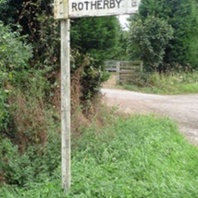
Viking Names
Rotherby
Rotherby, in the East Goscote Hundred of Leicestershire, comes from the Old Norse male personal name Hreiðarr and the Old Norse element by ‘farm, settlement’. The personal name here might be the same as that in Rearsby, Leicestershire. Later forms of the name show influence from Middle English rother ‘an ox’. Rotherby is now a joint parish with Hoby.
Read More
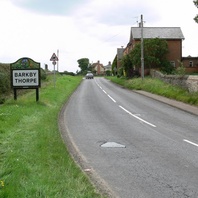
Viking Names
Barkby Thorpe
Barkby Thorpe, in the East Goscote Hundred of Leicestershire, is originally a simplex name from Old Norse þorp ‘a secondary settlement, a dependent outlying farmstead or hamlet’. This was a secondary settlement dependent on adjoining Barkby, thus the affix.
Read More
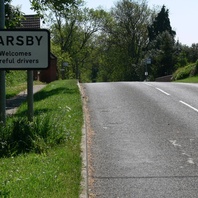
Viking Names
Barsby
Barsby, in the East Goscote Hundred of Leicestershire, likely comes from the Old Norse male personal name Barn, originally a byname from Old Norse barn ‘a child’, and the Old Norse element by ‘a farmstead, a village’. Alternatively, the first element may be barn itself.
Read More
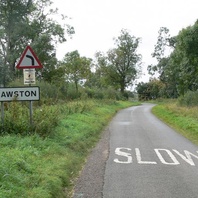
Viking Names
Slawston
Slawston, in the Gartree Hundred of Leicestershire, is an Anglo-Scandinavian hybrid from the Old Norse male personal name Slagr (Middle English genitive singular Slages), which appears to be originally a byname either from slœgr ‘sly, cunning’ or, less likely, from slagr ‘a blow, a stroke’ and the Old English element tun ‘farm, settlement’. This village might have been an Anglian settlement that was appropriated by a Scandinavian from the Viking army which disbanded in the area around 877 rather than a later manorial creation. Slawston is near Blaston, another township with a hybrid Old English/Old Norse place-name which could represent a similar appropriation.
